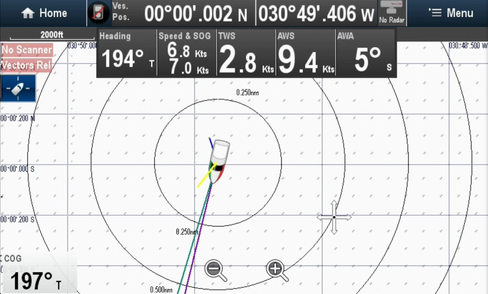Transat Diary - Day 9 - Bye bye Northern Hemisphere!
- Ana

- Jan 28, 2023
- 4 min read
Updated: Feb 6, 2023
Day 9 (2023-01-12)
The day started with the annoying South breeze that had started in the wee hours of the morning. Just 8 to 10 knots dead south, right on our nose.
It was enough to lift some sloppy uncomfortable waves contrary to the predominant swell from the Northeast. On the bright side during John's last night watch, all that occasional pounding and tossing dislodged the last of the seaweed that was fouling our Speed Log, we could now know with more certainty the True Wind and Apparent Wind Speeds and access the strength of the currents!
Somehow during the night, we seemed to also have been hit by a reasonably strong current running from East to West the North Atlantic current.
In the period of the night it had been strong enough to push us from our track just East of the PredictWind recommendations to just West of those.
The reason we were staying East of the PredictWind routing was to give us some wiggle room when the winds turned from Southeast to East-Southeast. We had just kept our position out of the windless ITCZ (Intertropical Convergence Zone) and had kept heading as straight south it was possible to us without being on a full beam reach.
We had not accounted for such a strong current, and neither did the PredictWind models.
With daylight, we hoisted our mainsail on a reef, the Jib on 3 reefs and bang we were doing 6, 7 and even 9 knots SOG (Speed Over Ground) for sure a lot due to the strong current (by now, the wind had also built to 12-15 knots true) on 40-50 AWA (Apparent Wind Angle). Even on a such close reach and the fact we were indeed nearly pointing to our destination the fact was between leeway and current our track was tracking nearly pure West instead of South-Southwest.
We tried our best for two hours or so before concluding that by the time the wind direction was supposed to change to more Southeast and drop speed as per the latest forecast, we would have covered considerable ground in the wrong direction!
Deflated we packed the Jib and returned to motoring, at least under the engine our leeway was much reduced and we could at least keep a heading close enough to what we needed. We hoped this would be just a few hours.
After a lot of discussion and analyses of our track and decisions and we still think our planning was the very best bet that involved minimal time in the doldrums. The only other course would have been getting trapped in the no wind zone and motor a bit more southeast than south to then catch these same winds much further East. In the end, the option we took would most likely take fewer engine hours and less time, while the other option would probably give us more comfort and risk of getting caught in the famous thunderstorms of the doldrums!
By lunchtime, most of the breeze had already subsided with the wind pushing less than 10 knots, but it would take most of the day for the chop over the predominant swell to abate.
I took the opportunity for several forced naps. John is still struggling with his sleeping patterns and couldn’t fall asleep so the plan was as it’s always been when the conditions and situation allow for me to do a big night watch of 4-5 hours after dinner and John to pick up in the early hours and do the same 4-5 hours.
I was getting quite excited, we were so close to the mythical equator!
From our quick calculations, we would cross the equator around 23.00 UTC, 22.00 Boat time (Cape Verde), I was so worried we would miss it with all my tiredness and because of the late hour that I put several alarms and constantly checked the chartplotter very much like a kid on the back seat of a car: “are we there yet? Are we there yet?”
Just as I was about to wake up John so we could join me in watching the crossing of the equator he woke by himself. Sleeping on passage is very much a strange process marked often by 1h sleeping patterns even without an alarm. You're constantly with one ear on what’s going on and easily wake by any change in wind speed, temperature, or motion, or you sleep through the loudest of events without noticing it. It’s all or nothing it seems.
I was a bit too excited and of course, didn’t even think about how long it actually takes us to cover 2 nautical miles, so is no surprise we "had arrived too early to the party”, we patiently waited with our eyes glued on the screen. And then there it was, we were just seconds from crossing this mythical imaginary line.
At 23h35 UTC, we finally said goodbye to the Northern Hemisphere and hello to the Southern one.
We served King Neptune a glass of fine white wine and cheered him, before quickly returning to sleep in the case of John and updating the family etc., in my case.

This was a huge milestone not only physically as it is a quite challenging sail route but also psychologically and emotionally due to all the troubles we’ve had to get here.
24h daily run 149 nautical miles.
***In the spirit of sharing our dreams and experiences we have shared this blog post in the NOFOREIGNLAND.COM website sailors community.








Comments